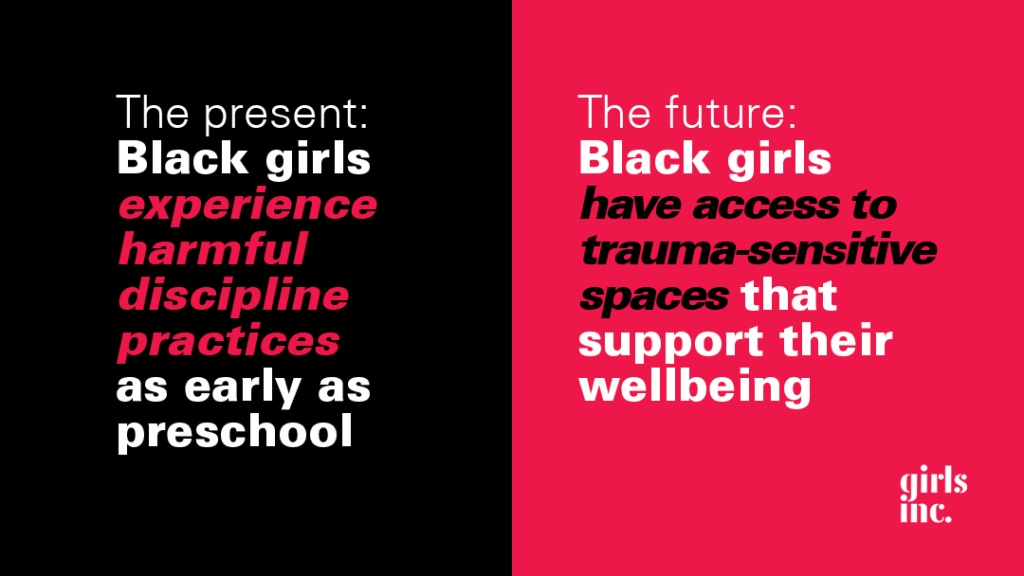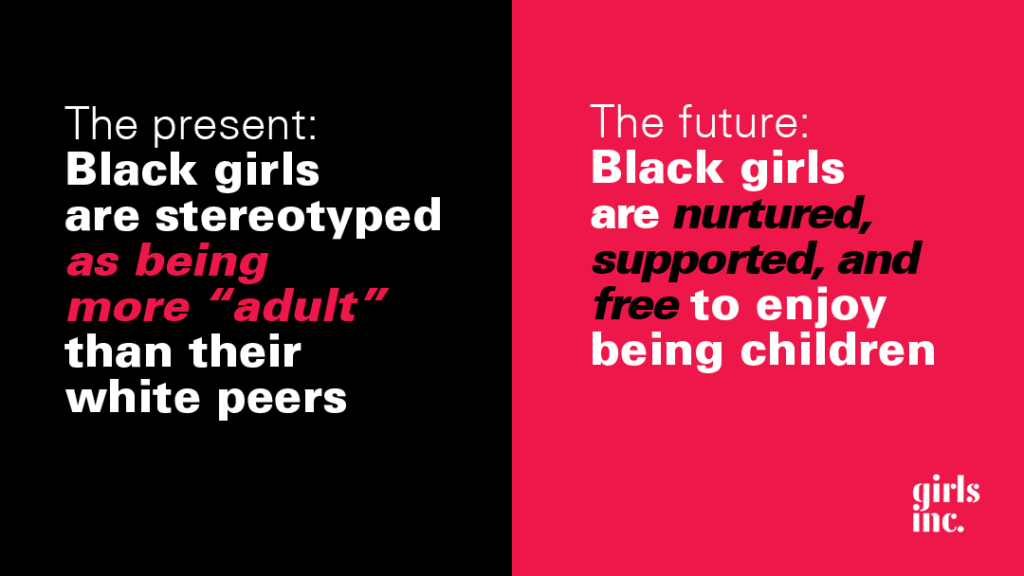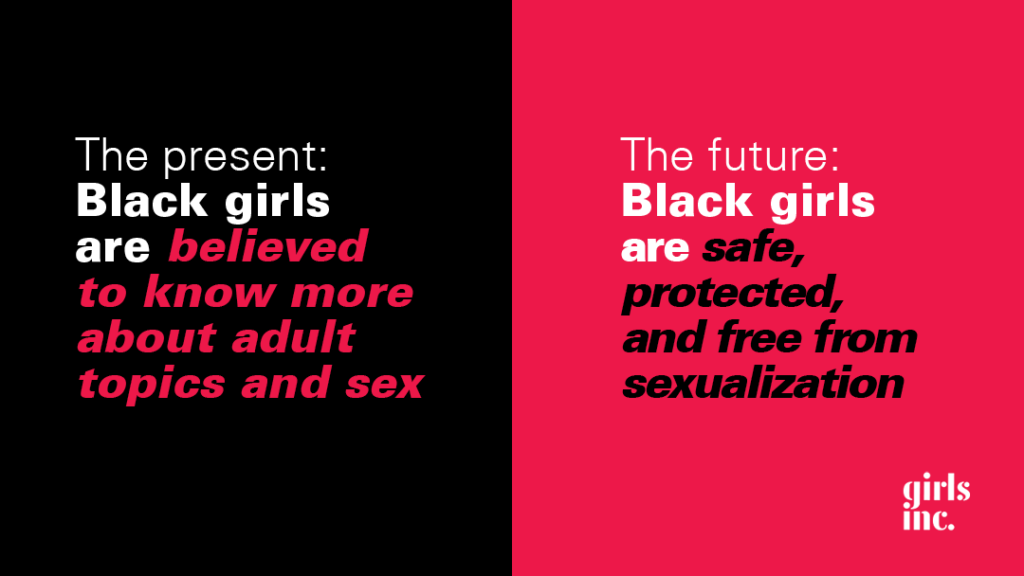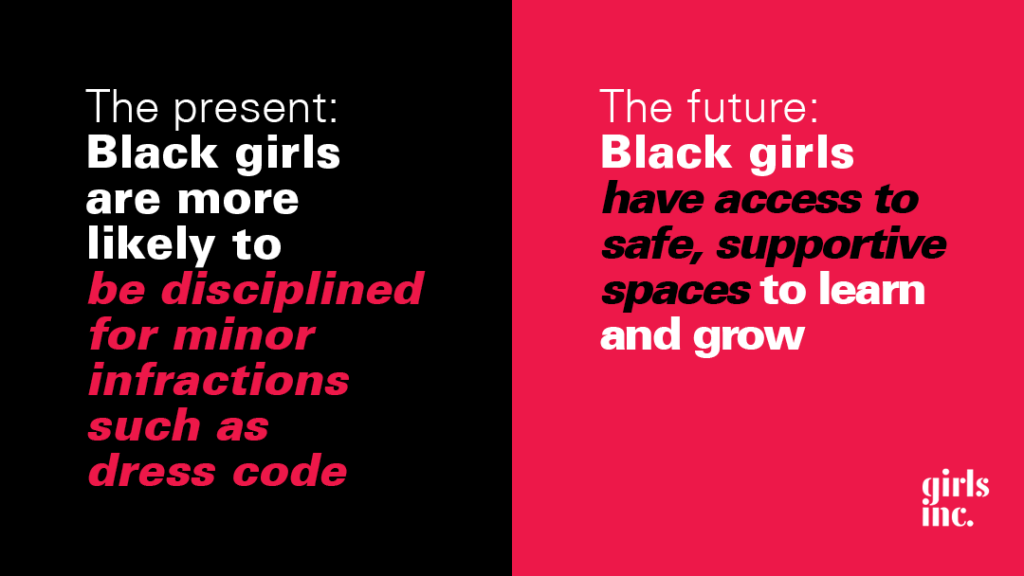Envisioning the #BlackGirlFuture
More than 70% of the girls Girls Inc. affiliates serve across the U.S. and Canada identify as girls of color, 40% of whom are Black girls. The growing outrage and protest of the systemic racism in the U.S. and police brutality and violence toward the Black community led Girls Inc. to launch #BlackGirlFuture, a network-wide social media campaign built around the disparities that impact the girls and the future we want to see for them.

seeking an equitable future while Acknowledging current Disparities
#BlackGirlFuture focuses on how Black girls are perceived and treated in school and by adults in comparison to their non-Black peers. It illuminates toxic misconceptions of Black girls that put them in danger of adultification, sexual violence, and excessive discipline. At the same time, the campaign aims to forge the path towards a safer, more supportive future for Black girls – one that prioritizes their needs and guarantees them spaces where they can learn, play, and just be themselves without fear of harm or discrimination.


Across the Girls Inc. Network, affiliates shared the #BlackGirlFuture campaign across their social channels to spread awareness and performed outreach to local media outlets to further amplify the campaign. This includes Girls Inc. of Memphis, whose President & CEO Lisa Moore originally suggested the idea for the campaign. In an interview with 22News, Girls Inc. of the Valley executive director Suzanne Parker stated, “Just with everything going on in the world right now and our heightened awareness around social justice issues and racial violence, it’s just so important for people to educate themselves, and this is one effort we’re making to educate the community around [what] black girls are facing.” Girls Inc. of Greater Philadelphia & Southern New Jersey executive director Dena Herrin released a message that elaborated on the racial barriers that Black girls face in school, urging the communities of Greater Philadelphia to stand together and work collectively towards equity.


Supportive response
The impetus behind the#BlackGirlFuture campaign was the belief that we have to acknowledge the realities our girls face so we can start to address them. Girls Inc. was thrilled to see how positive the reception of the campaign was among our affiliates and our supporters on social media. It means that the future we envision— where Black girls are nurtured and safe in school, free to enjoy childhood, and always supported by adults—can become reality.
Statistics that informed #Blackgirlfuture
In the 2015-2016 school year, Black girls made up 16% of the total female public school population, yet Black girls made up…
- 49% of female students who experienced corporal punishment
- 47% of female students who experienced out-of-school suspension
- 41% of female students who experienced school-related arrests
- 36% of female students who reported being bullied on the basis of race
- 35% of female students referred to law enforcement
- 24% of girls who were expelled under zero-tolerance policies
Increased levels of law enforcement and security often make girls of color feel less safe and less likely to attend school.
Adults tend to view Black girls as more “mature” than their white peers.
- Adults believe that Black girls need less nurturing, less protection, and less comforting than white girls their same age
- They believe that Black girls know more about adult topics and sex than their white peers
- The perception of Black girls as being “less innocent” can contribute to harsher punishment in school, fewer leadership opportunities, and less support in school
- Black girls are more likely than their white peers to be disciplined for minor infractions, such as dress code violations, cell phone use, and loitering
The fact that Black girls are stereotyped as being more “adult” than their white peers can cause adults to have less empathy for Black girls and cause adults to treat Black girls in developmentally inappropriate ways.
Harmful discipline practices begin early; excessive discipline that Black children experience as early as preschool for offenses such as disruptive behavior and tantrums makes them 10 times more likely to face discipline, grade retention, or even incarceration later in life.
Resources
Civil Rights Data Collection. 2015-16 State and National Estimations. Retrieved from https://ocrdata.ed.gov/StateNationalEstimations/Estimations_2015_16
Crenshaw, K., Ocean, P. and Nanda, J. (2015). Black girls matter: Pushed out, overpoliced, and underprotected. New York, NY: African American Policy Forum and Center for Intersectionality and Social Policy Studies. Retrieved from https://aapf.org/blackgirlsmatter
Epstein, R., Blake, J.J., and Gonzalez, T. (2017). Girlhood interrupted: The Erasure of Black girls’ childhood. Washington, DC: Center on Poverty and Inequality at Georgetown Law. Retrieved from https://www.law.georgetown.edu/poverty-inequality-center/wp-content/uploads/sites/14/2017/08/girlhood-interrupted.pdf
Blake, J.J. and Epstein, R. Listening to Black women and girls: lived experiences of adultification bias. Washington, DC: Center on Poverty and Inequality at Georgetown Law. Retrieved from https://endadultificationbias.org/wp-content/uploads/2019/05/Listening-to-Black-Women-and-Girls-v7.pdf
Turner, C. (2016). Bias isn’t just a police problem, it’s a preschool problem. Retrieved from https://www.npr.org/sections/ed/2016/09/28/495488716/bias-isnt-just-a-police-problem-its-a-preschool-problem
Davidson, J. (2016). Preschool suspension rates are made worse by racial disparities. Retrieved from https://www.washingtonpost.com/news/powerpost/wp/2016/06/13/preschool-suspensions-are-made-worse-by-racial-disparities/
USDHHS and USDOE. Policy statement on expulsion and suspension policies in early childhood settings. Retrieved from https://www2.ed.gov/policy/gen/guid/school-discipline/policy-statement-ece-expulsions-suspensions.pdf
